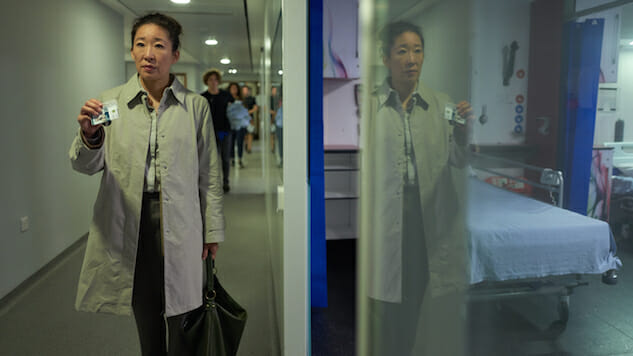Sandra Oh: Don’t Think Killing Eve Is an Allegory About Female Friendships
Photo: BBC America
Female relationships are often complicated labyrinths, heavy with double meanings, obsessive tendencies, platonic (though maybe not completely platonic) crushes and backstabbing that only the deeply lucky and skilled can successfully navigate throughout their lifetimes.
They also are, naturally, frequent fodder for storytelling. They’re modern enough to warrant an entire episode of Netflix’s Black Mirror and a song in the second-ever episode of The CW’s Crazy Ex-Girlfriend. (Sample lyric: “I wanna lock you in a basement with soundproof walls and take over your identity.”) But they’re also so steeped in tradition. In her book Alice + Freda Forever historian Alexis Coe credits the expectedness of some of these qualities as the reason why a couple of 19th century Memphis school girls could carry on their Sapphic relationship unnoticed—until one of them, once scorned, murdered her ex in the middle of the street on a winter afternoon.
So it’s no wonder that so many have taken Fleabag creator Phoebe Waller-Bridge‘s new BBC America series, Killing Eve, as an allegory for this concept. The series, which is based on the characters in author Luke Jennings ‘ Villanelle novellas, stars Jodie Comer and Sandra Oh as the equal parts hunter and hunted in a dry-witted international caper. Comer’s exceptionally talented and creative hit woman enjoys her work almost as much as she does the wardrobe allowance it allows her to have; Oh is Eve Polastri, the MI5 desk jockey whom new boss Carolyn (Fiona Shaw) recognizes as being way too good at her job.
Neither woman wastes much time before researching what she can about the other, once the chase is on. Each has a growing obsession with—and respect for—the other’s work, and is curious enough to want to know more about her. And, as we’ll see in this Sunday’s episode, neither can resist the adrenaline rush that comes with the risk of potentially finding out that information. (Things only escalate from there—just wait until the fifth episode.)
Still, slow down. Don’t, advises Oh, immediately peg Killing Eve as a commentary on the social behaviors of first world women.
“I feel a little wary about putting it in terms of an obsessive female friendship,” tells Paste. “I feel like that terminology… I feel like we’re outside of that. While I understand a sisterhood toward that, I think our show is outside of it. And going beyond those familiar constraints around that type of—when you fall in love with a friend [and] you’re totally into each other.”
Was there discussion beyond that? “Only in getting smaller and smaller into the motivations and the intentions specifically to each character,” Oh says.
Rather, she suggests that we think of Eve a woman who’s “plateaued” in her career—as well as in her marriage to the most understanding husband ever, Owen McDonnell’s Niko. Oh offers a reminder that this is a common experience for everyone, even government spies, and that it often occurs at midlife, when we enter “a place where you can become a little too comfortable and you stop being so curious.”
-

-

-

-

-

-

-

-

-

-

-

-

-

-

-

-

-

-

-

-

-

-

-

-

-

-

-

-

-

-

-

-

-

-

-

-

-

-

-

-








































